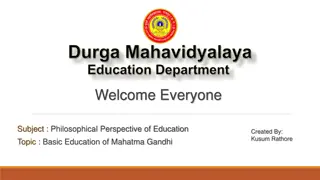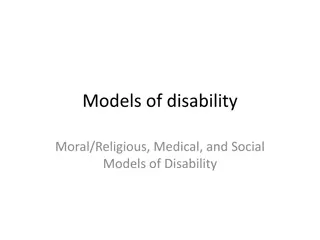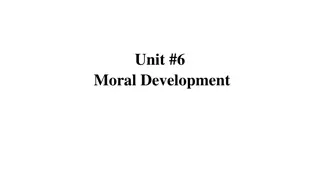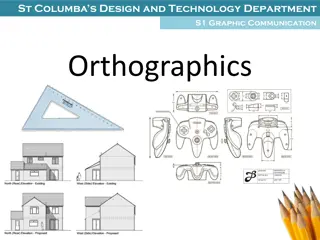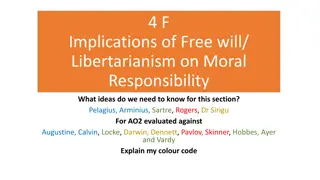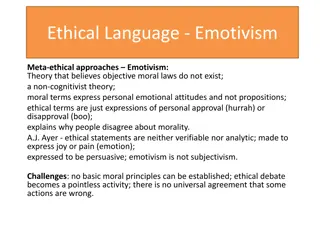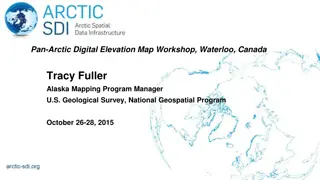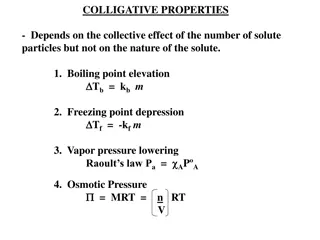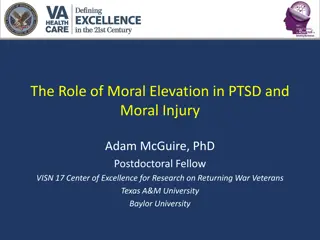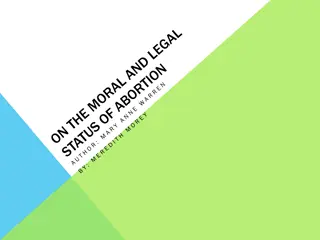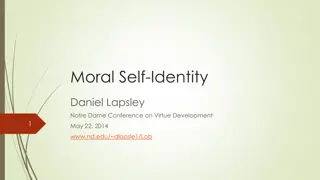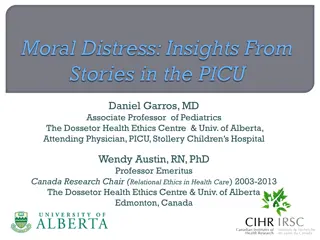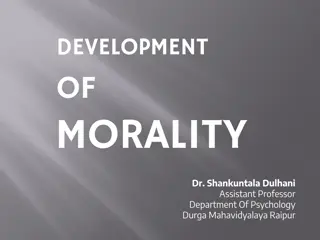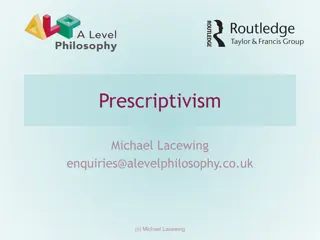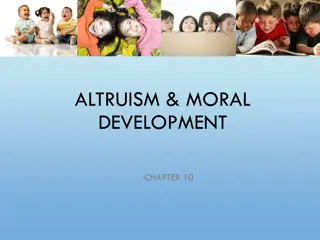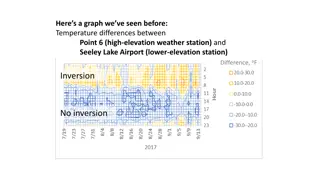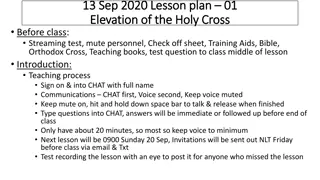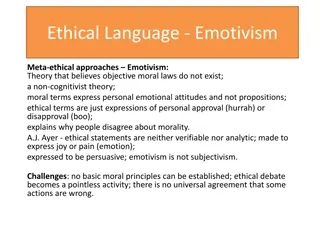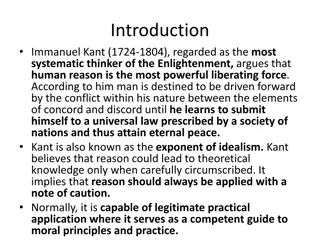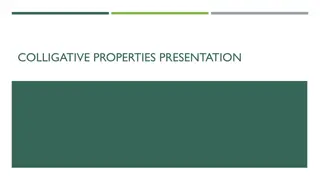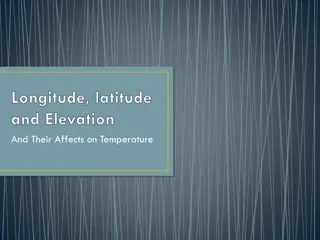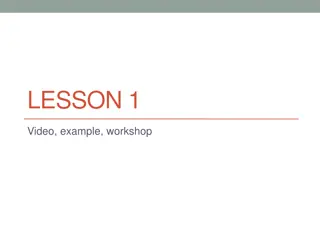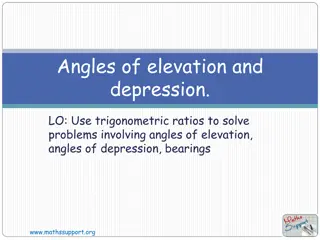ARREST Trial: Expedited Transfer for Non-ST Elevation OHCA
This prospective, multicentre, randomised clinical trial led by Dr. Tiffany Patterson aims to determine whether direct delivery to a cardiac arrest centre following non-ST elevation out-of-hospital cardiac arrest reduces deaths compared to delivery to the nearest emergency department. Funded by the
0 views • 17 slides
Uncovering the Violent History of Capitalistic Enclosures
Explore the historical context of capitalist enclosures, their violent impacts on peasants, and the moral justifications used to conceal these atrocities. Delve into how economic narratives created moral bubbles to justify violent acts, as examined through the lens of Marx's analysis. Unveil the par
1 views • 11 slides
Durga Mahavidyalaya
Education is viewed as the acquisition of knowledge, skills, beliefs, and moral habits. Mahatma Gandhi introduced his Basic Education concept emphasizing free and compulsory education, mother tongue instruction, craft-centered learning, moral education, and character building. The curriculum include
0 views • 6 slides
Understanding Models of Disability: Moral, Medical, and Social Perspectives
The concept of disability is explored through moral/religious, medical, and social models. Impairment refers to a loss or abnormality in structure or function, while disability is a restriction in performing activities. The discussion also delves into the significance of person-first language and th
1 views • 35 slides
Cultivating Decency and Moral Excellence in Daily Life
Embrace a life of decency and moral refinement through moderation, purity, and vigilance. Uphold virtues of modesty, temperance, and clean-mindedness in all aspects of existence, fostering an environment of respect and dignity. Strive to elevate your character towards the divine, embodying qualities
0 views • 18 slides
Introduction to Hubitat Elevation: Smart Home Automation Hub
Hubitat Elevation is a local smart home automation hub that connects to Zigbee and Z-wave devices, offering features like command and control of various devices through a private network. The hub provides flexibility with licensing, loggable sensors, and support for a wide range of devices. Learn ho
2 views • 22 slides
Understanding Kohlberg's Stages of Moral Development
Kohlberg's stages of moral development, built upon Piaget's psychological theory, outline six developmental stages of moral reasoning, with each stage offering a higher level of response to moral dilemmas. Kohlberg focused on justice in moral development and emphasized the importance of how individu
0 views • 19 slides
Understanding Moral Development and Moral Reasoning
Moral development involves an individual's sense of right and wrong, influenced by family, school, friends, and societal environment. Children learn moral concepts from interactions with parents, teachers, peers, and society, shaping their understanding of good and bad. Additionally, moral reasoning
0 views • 13 slides
Understanding Personhood: Philosophical Perspectives on Moral Consideration
Exploring the concept of personhood involves delving into what it means to be part of a moral community and deserving of moral consideration. Various criteria, from genetic to cognitive and social, are discussed, shedding light on the complex debates surrounding animal rights, abortion, euthanasia,
0 views • 10 slides
Exploring Orthographic Drawing in Design and Technology Education
Delve into the world of orthographic drawing through St. Columba's Design and Technology Department's S1 Graphic Communication program. Discover the significance of orthographics in visualizing 3D objects as 2D drawings, learn about orthographic views like Elevation, Plan, and End Elevation, and exp
0 views • 8 slides
Moral Responsibility and Free Will Implications in a Contemporary Context
This text delves into the implications of free will and libertarianism on moral responsibility, examining the ideas of various philosophers and thinkers such as Pelagius, Arminius, Sartre, and more. It explores the concepts of moral agency, determinism, normative ethics, religious beliefs, and the c
5 views • 12 slides
Understanding Emotivism in Ethical Philosophy
Emotivism is a meta-ethical theory that rejects objective moral laws, instead positing that moral terms express personal emotional attitudes, not universal truths. Influenced by A.J. Ayer and rejecting naturalism, this theory suggests that ethical statements are not objective propositions but rather
0 views • 28 slides
Pan-Arctic Digital Elevation Map Workshop Overview
Learn about the Pan-Arctic Digital Elevation Map Workshop held in Waterloo, Canada in October 2015, where discussions revolved around data requirements, project backgrounds, major participants, and the importance of Digital Elevation Models (DEMs) in various Arctic applications. The workshop aimed t
1 views • 18 slides
Challenges and Opportunities of Moral Revolution in Indonesia
The need for a moral revolution in Indonesia to address societal issues like corruption, conflict, and intolerance. Contrasting mental and moral revolutions, the focus is on behavior change to build a humane society with healthy moral values. Initiatives and discussions highlight the urgency of tran
0 views • 13 slides
Understanding Colligative Properties in Solutions
Colligative properties in solutions depend on the total concentration of solute particles present, impacting properties such as boiling point elevation, freezing point depression, vapor pressure lowering, and osmotic pressure. Boiling point elevation is directly proportional to the number of solute
1 views • 19 slides
Understanding Moral Elevation in PTSD and Moral Injury
The research by Dr. Adam McGuire explores the role of moral elevation in PTSD and moral injury, emphasizing how witnessing virtuous behaviors triggers emotional and physical responses leading to a desire for imitating virtuous acts. By integrating prosocial emotions into trauma treatment, the positi
0 views • 13 slides
Understanding Humanity and Moral Community in the Context of Abortion Ethics
Exploring the complex ethical considerations surrounding abortion, this discussion delves into determining the humanity of a being, defining the moral community based on traits of personhood, fetal development, and the right to life. The arguments include the morality of abortion, the definition of
0 views • 9 slides
Challenges to Moral Anti-Realism: Objections and Responses
The article explores objections to moral anti-realism, including moral nihilism, condemning immorality, and the notion of moral progress in the absence of moral reality. It addresses concerns about the justification for interfering with others' behavior, the relationship between moral beliefs and ob
0 views • 6 slides
Understanding Moral Self-Identity Development
Situating moral self-identity within ethical theory and developmental psychology, this overview explores the centrality of morality within the self-concept. It discusses the chronic accessibility of moral schemas, the importance of strong evaluation in moral behavior, and the connection between mora
0 views • 33 slides
Understanding Moral and Constitutional Values in Relation to Judiciary
Explore the concepts of moral values and constitutional values, emphasizing their importance in decision-making processes and societal norms. Discover the stages of moral development and delve into constitutional values such as sovereignty, socialism, secularism, democracy, justice, liberty, equalit
0 views • 9 slides
Analysis of Moral Language in Political Communication
Explore how Republican and Democratic elites use distinctive moral language and its impact on voters in the context of the 2012 election data. Discover the application of Moral Foundations Theory in understanding political differences in the United States and how moral intuitions influence public op
0 views • 13 slides
The Influence of Disgust on Moral Behavior in Psychological Research
Explore the impact of disgust on moral behavior through various studies, including moral dilemmas and criteria for moral judgment. Research delves into how disgust affects decision-making processes related to moral dilemmas and helping behavior. Discover the connection between physical disgust and i
0 views • 16 slides
Understanding Moral Distress in Healthcare
This content discusses the concept of moral distress in healthcare, defined as the pain and anguish experienced when one knows the right thing to do but faces internal or external barriers preventing action. It explores the implications of moral distress on healthcare practitioners and emphasizes th
0 views • 25 slides
Insights on Moral Injury Among Women Veterans: Preliminary Study Findings
Preliminary results from a grounded theory study on moral injury in U.S. women veterans reveal themes such as sexual assault, hostile work environments, and more. Participants shared their experiences, highlighting the nature of moral injury they faced, distinguishing between various forms of discri
0 views • 21 slides
Understanding Moral Development: Insights and Perspectives
Morality is the belief in right behavior accepted by society. It involves moral behavior, feelings, and judgments. Moral development evolves from childhood to adulthood, influenced by experiences and challenges. Freud's id, ego, and superego theory and Skinner's behaviorism contribute to our underst
0 views • 12 slides
Exploring Moral Judgments and Prescriptive Meaning in Ethics
This content delves into non-cognitivism, Hare’s prescriptivism, and moral anti-realism to understand what we do when making moral judgments. It discusses prescriptive meaning, the concept of good, and how moral language guides actions. The objections raised regarding moral language's functions, p
0 views • 9 slides
Understanding Altruism and Moral Development Theories
Explore the components of morality, theories of moral development by prominent psychologists like Piaget and Kohlberg, and the stages of moral development in individuals. Learn about moral affect, reasoning, and behavior as integral aspects shaping one's ethical framework and decision-making process
0 views • 40 slides
Analysis of Temperature Differences and Inversions at Various Elevations
This analysis examines temperature differences and inversions between high-elevation weather stations and lower-elevation stations in a mountainous region. It explores how daytime inversions at lake levels could impact smoke concentrations in the valley, particularly focusing on the effects on air q
0 views • 6 slides
Understanding the Elevation of the Holy Cross Feast
The Elevation of the Holy Cross, celebrated on September 14, commemorates the finding and recovery of the Cross. Learn about Empress Helen's devotion and the significance of the Cross as a Christian symbol. Dive into historical events and the enduring impact of Constantine and his mother in this les
0 views • 10 slides
Friedrich Nietzsche's Genealogy of Morals: Uncovering the Evolution of Moral Values
Friedrich Nietzsche critiques traditional philosophy for overlooking the historical development of moral concepts. He argues that moral judgments were initially based on strength and power, later evolving into the dichotomy of master and slave morality. By tracing the genealogy of moral terms, Nietz
0 views • 10 slides
Understanding Emotivism: A Non-Cognitivist Theory in Ethics
Emotivism is a meta-ethical theory that posits the absence of objective moral laws, suggesting moral terms express personal emotional attitudes rather than propositions. Influenced by philosophers like A.J. Ayer and Hume, it challenges the existence of basic moral principles and universal agreement
0 views • 23 slides
Exploring Mars 2020 Elevation Constraints and Geological Features
The content showcases images and information related to the exploration of Mars, focusing on the Nili Fossae Trough site and the unique geological features present. It highlights the diverse materials discovered, elevation challenges, slope characteristics, and the composition of ancient Martian ter
0 views • 32 slides
Kant's Moral Philosophy: Reason, Freedom, and the State
Immanuel Kant, a prominent Enlightenment thinker, emphasizes the liberating power of human reason in guiding individuals towards moral principles and practices. Kant's moral philosophy centers on treating each person as an end-in-itself, driven by the good will informed by reason. His concept of mor
0 views • 14 slides
Understanding Colligative Properties in Chemistry
Colligative properties in chemistry depend on the amount and type of solute particles added to a sample, as well as the intermolecular forces at play. They include vapor pressure, boiling point elevation, and freezing point depression. Vapor pressure is the pressure exerted by a vapor on its surroun
0 views • 7 slides
Importance of Surveyors in Elevation Certification and Mapping
Surveyors play a crucial role in elevation certification and mapping processes, ensuring compliance with ordinances and insurance requirements. Elevation certificates, LOMCs, and other documents are essential in determining flood risk and insurance premiums, highlighting the significance of accurate
0 views • 6 slides
Understanding Latitude, Longitude, and Elevation for Weather Prediction
Latitude and longitude are used to locate places on Earth, while elevation represents the height above sea level. These geographical factors play a crucial role in determining temperature variations across different regions. The Equator, Prime Meridian, and other key lines help in dividing the Earth
0 views • 10 slides
Exploring Motion through Elevation-Time Graphs
Dive into understanding motion using elevation-time graphs in this interactive lesson. Analyze the motion of individuals in videos, interpret graphs, and grasp the concept of piecewise-defined linear functions. Engage in practical exercises and workshops to enhance your fluency in representing motio
0 views • 45 slides
Trigonometry: Angles of Elevation and Depression in Real Life
Explore how trigonometric ratios are used to solve problems involving angles of elevation and depression in real-life scenarios. Understand the concepts, applications, and calculations related to determining heights, distances, and angles in various situations. Learn through examples with clear expl
0 views • 9 slides
Forms of Moral Reasoning and Ethics in Decision-Making
Explore the main forms of moral reasoning in ethical decision-making, including virtue ethics, deontological reasoning, and teleological reasoning. Understand the importance of developing ethical virtues and principles in guiding behavior. Delve into examples of reasoning from virtue and deontologic
0 views • 28 slides
Elevation stone tiles
A growing number of businesses and homes are using elevation stone tiles to improve the visual attractiveness of their premises. These tiles are intended to give both external and interior walls a lovely and useful accent. Elevation stone tiles provi
1 views • 3 slides


